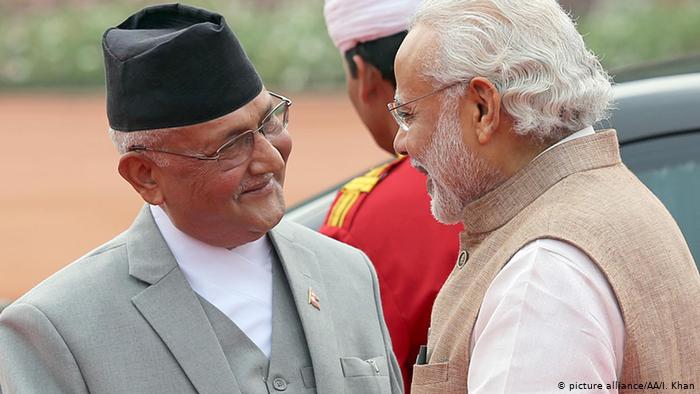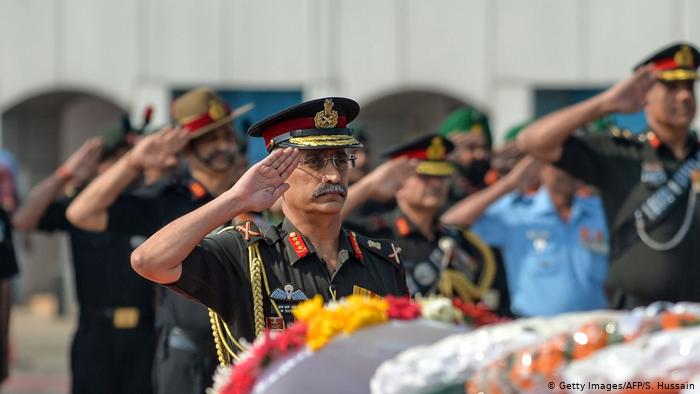India's army chief is visiting Nepal amid strained relations between New Delhi and Kathmandu after both sides caught up in a border dispute over controversial land in the Himalayan region.
Indian army chief General Manoj Mukund Naravane is in Nepal for a three-day visit beginning November 4 where he will be conferred the honorary rank of general of the Nepali army in an investiture ceremony.
Since 1950, Nepal and India have been decorating the chiefs of each other's armies with the highest army rank. Nepal's President Bidhya Devi Bhandari will confer the honorary rank upon General Naravane.
During his trip, the Indian army chief is set to hold talks with President Bhandari, Nepali Prime Minister KP Sharma Oli and his Nepali counterpart, General Purna Chandra Thapa.
The spokesperson of the Nepali army, Brigadier Santosh Ballav Poudel, told DW that the trip was supposed to take place in February this year, but it was postponed due to the COVID-19 pandemic.
The visit assumes significance as it comes against the backdrop of tensions over bilateral territorial disagreements concerning a piece of land in the Himalayan region.
Nepali prime minister's foreign policy adviser, Rajan Bhattarai, told DW that the two neighbors are ready to engage in dialogue despite differences over border issues. "We will exploit this opportunity to end the diplomatic impasse and resume dialogue on our differences," he said.
Territorial dispute
The latest border spat between the two countries began in November 2019, when New Delhi unveiled a new map of India showing disputed sites — Lipulekh, Limpiyadhura and Kalapani — as part of its territory.
Nepal, which was never under colonial rule, has long claimed these areas in accordance with the 1816 Sugauli treaty with the British Raj following the Anglo-Nepalese (Gurkha) War.
The treaty recognized the Kali River as Nepal's western boundary with India and the land lying east of the river is Nepalese territory. People living in Kalapani, Lipu Lekh and Limpiyadhura had cast votes during Nepal's 1959 general election and been paying taxes before the conflict erupted.
India then fought a war with China in 1962, and these areas have remained in control of Indian troops since.

Kathmandu condemned New Delhi's move to include them in its new political map and sought an immediate reversal, but the Indian government ignored Nepal's repeated calls for talks to resolve the dispute.
The spat escalated further after New Delhi announced on May 8 the inauguration of an 80-kilometer-long (50-mile) road that passes through Lipu Lekh, a disputed area that lies at a strategic three-way junction with Tibet and China.
The unilaterally built motorway links India's Uttarakhand State to Tibet's Kailash Mansarovar via the Lipu Lekh Pass, a territory historically claimed by Nepal and considered one of the shortest and most practicable trade routes between India and China.
The small Himalayan nation challenged India's inauguration of the road, viewing the move as another example of bullying by its much larger neighbor.
A rare show of unity
Nepali Prime Minister KP Sharma Oli denounced the road inauguration. He also blamed New Delhi for trying to unseat him by stirring intra-party feuds within his ruling Nepal Communist Party (NCP).
The Indian government and media, however, tried to portray Oli and his government as puppets of China — even though Kathmandu still has an unresolved border dispute with China over Lipulekh Pass.
Indian Army Chief Narvane also spoke on the matter, claiming that Nepal's objection to the road construction could have been done at the "behest of someone else" — widely regarded as an indirect reference to China.
Such blunt remarks from India's sitting army chief — who also holds the honorary general rank of the Nepali Army — irked Nepal, bringing a rare show of unity among the country's bickering political parties.
In response to India's move, Nepal came up with its own new political map including the 335 square kilometers of disputed area within its borders.
Nepal's Parliament also amended the country's constitution to legalize the new map and printed it in school and university textbooks and official documents.
Kathmandu's moves surprised New Delhi, which issued a statement rejecting Nepal's new map and saying it was a "unilateral act."
Nepal says it is always open to resolve the border issues through dialogue — despite the constitutional change to legalize the new map.
Latest Stories
-
I didn’t speak against holding wrongdoers accountable – Rev. Kwadwo Bempah clarifies ORAL comment
43 minutes -
RSS Developers to hold 3-day open house event on home purchasing from Friday, Dec. 27
1 hour -
Elikem Treveh: How TEIN UMaT students contributed significantly to NDC’s victory in Tarkwa Nsuaem constituency
1 hour -
Joy FM Family Party in the Park kicks off with excitement at Aburi Botanical Gardens
2 hours -
JP U-15 Cup 2024: Fadama Ajax wins maiden edition
2 hours -
Lured for Love, Caged for Cash: How an 80-year-old American seeking love was kidnapped in Ghana by a Nigerian gang
3 hours -
Star Oil Ltd @ 25: Driving Growth and Profitability with a Vision for Renewable Energy and a Sustainable Future
3 hours -
American Airlines resumes flights after technical issue
4 hours -
NDC Greater Accra Chairman dismisses unauthorised appointment nomination request
4 hours -
Man City might miss out on Champions League – Guardiola
5 hours -
Joy FM’s Party in the Park set to thrill at Aburi Botanical Gardens today
5 hours -
KiDi performs with childhood idol, Kojo Antwi at ‘Likor On The Beach’
5 hours -
South Korea MPs file motion to impeach acting president
6 hours -
Star Oil Ltd @ 25: Driving growth and profitability with a vision for renewable energy and a sustainable future
6 hours -
Bald eagle officially declared US national bird after 250 years
6 hours

